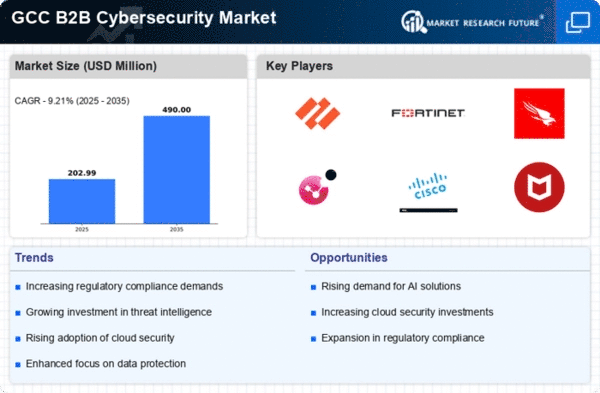Rising Cyber Threat Landscape
The b2b cybersecurity market is experiencing heightened demand due to an increasingly complex cyber threat landscape. Organizations in the GCC are facing sophisticated cyberattacks, including ransomware and phishing schemes, which have surged by approximately 30% in recent years. This escalation compels businesses to invest in advanced cybersecurity solutions to safeguard sensitive data and maintain operational integrity. The GCC region, with its rapid digital transformation, is particularly vulnerable, as many enterprises are transitioning to cloud-based services without adequate security measures. Consequently, the The GCC B2B Cybersecurity Market is projected to grow significantly, with estimates suggesting a compound annual growth rate (CAGR) of around 15% over the next five years. This growth reflects the urgent need for robust cybersecurity frameworks to mitigate risks and protect organizational assets.
Increased Regulatory Pressures
Regulatory compliance is becoming a critical driver for the b2b cybersecurity market in the GCC. Governments are implementing stringent regulations to protect data privacy and ensure cybersecurity resilience. For instance, the introduction of laws such as the UAE's Data Protection Law and Saudi Arabia's Personal Data Protection Law mandates organizations to adopt comprehensive cybersecurity measures. Non-compliance can result in hefty fines, potentially reaching up to 2% of annual revenue. As a result, businesses are compelled to invest in cybersecurity solutions that not only meet regulatory requirements but also enhance their overall security posture. This trend is likely to propel the b2b cybersecurity market, as organizations seek to align their practices with evolving legal frameworks and avoid the financial repercussions of non-compliance.
Digital Transformation Initiatives
The ongoing digital transformation initiatives across various sectors in the GCC are acting as a catalyst for the b2b cybersecurity market. As organizations adopt new technologies, such as cloud computing and the Internet of Things (IoT), they inadvertently expose themselves to new vulnerabilities. The rapid shift towards digital platforms has led to an increased reliance on data, making cybersecurity a top priority. Companies are investing in comprehensive cybersecurity strategies to protect their digital assets and ensure business continuity. This trend is likely to drive the b2b cybersecurity market, as organizations seek to implement robust security frameworks that can adapt to the evolving technological landscape and mitigate potential risks associated with digital transformation.
Growing Awareness of Cybersecurity Risks
There is a notable increase in awareness regarding cybersecurity risks among businesses in the GCC, which is significantly influencing the b2b cybersecurity market. Organizations are recognizing that cyber threats can lead to substantial financial losses, reputational damage, and operational disruptions. Recent studies indicate that cyber incidents can cost companies an average of $3.86 million per breach. This awareness is driving companies to prioritize cybersecurity investments, leading to a surge in demand for advanced threat detection and response solutions. As businesses strive to protect their assets and maintain customer trust, the b2b cybersecurity market is expected to expand, with a focus on innovative technologies such as artificial intelligence and machine learning to enhance security measures.
Emergence of Managed Security Service Providers
The emergence of Managed Security Service Providers (MSSPs) is reshaping the b2b cybersecurity market in the GCC. Many organizations, particularly small and medium-sized enterprises, are finding it challenging to maintain in-house cybersecurity expertise due to resource constraints. MSSPs offer specialized services that allow businesses to access advanced security technologies and expertise without the need for significant capital investment. This trend is likely to accelerate the adoption of cybersecurity solutions, as companies can leverage the capabilities of MSSPs to enhance their security posture. The b2b cybersecurity market is expected to benefit from this shift, with MSSPs playing a crucial role in providing scalable and cost-effective security solutions tailored to the unique needs of businesses in the region.
















